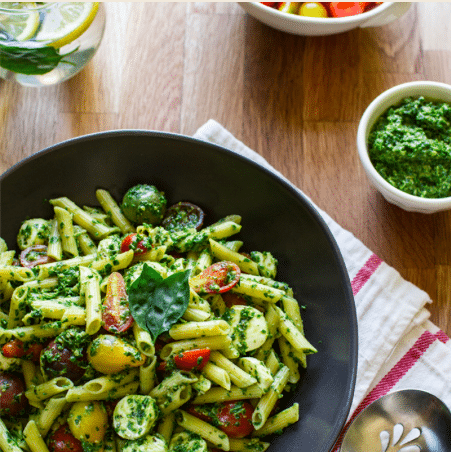As common as feeling hungry after meals may be, it’s incredibly frustrating too. If you have a grumbling stomach soon after a meal and wonder, “Why am I still hungry after eating?” it could be more reasons than one.
Don’t wait till you’ve gained extra pounds because of your insatiable appetite. Read on to find the reasons for your baffling hunger post-mealtime.
12 Reasons You’re Always Feeling Hungry After Eating
Hunger is your body sending signals to your brain that you need food. But, when you start feeling hungry after a meal, there could be several factors, like your diet, lifestyle, or hormones contributing to this.
1. You’re Not Really Hungry
Not all hunger pangs are physical hunger. If you’re reaching out for your fridge or pantry door shortly after a meal, it could be due to psychological reasons.
It’s common to find solace in food while coping with stress or uncomfortable emotions like anxiety, depression, or sadness. Often, people also tend to confuse boredom with hunger.
The tendency to eat (or over-eat) can also stem from feeling emotionally deprived of food (the forbidden things always seem more tempting). And then, there are those social gatherings where you tend to eat more than usual (it could be because of social pressure).
Whether you’re binge eating or emotional eating, you must try to be more aware of the times you eat when you’re not really hungry and start changing those patterns.
2. Insufficient Fiber Intake
‘Eat your veggies‘ is something we hear mothers tell their kids all the time. But, this is something health care professionals and dietitians will also tell you.

The recommended intake of vegetables is five servings per day (one serving is the equivalent of how much you can hold with your closed fist) with 1-2 serves of fruit. This makes up for your daily fiber intake.
Too many refined carbohydrates or sugars won’t keep you feeling full for a longer time; it’s the fiber that’ll do the trick. Include high-fiber foods like legumes, whole grains, fruits, vegetables, nuts, and seeds in your daily food intake rather than filling yourself with highly processed foods.
Fiber is low-calorie and indigestible; it takes longer to digest and keeps you feeling full for longer. Sneak in that fiber on your toast or smoothie as a side serving or snack between meals.
3. You’re Eating an Unbalanced Meal
A balanced meal is one that’s rich in healthy fats, protein, and complex carbohydrates (mainly fiber-rich sources). This helps slow down your digestion and keeps you feeling full for longer.
With a high-protein diet and a little bit of healthy fat (opt for moderate consumption of unsaturated fat), the food moves slower through your digestive tract, and your body gets all the nutrients it needs to stay healthy.
A meal that lacks protein is most likely composed of refined carbohydrates that can cause severe blood sugar fluctuations, triggering your body to want more food.
Try to have a high-protein breakfast, but also incorporate some protein with each meal or snack to maintain a healthy appetite throughout the day.
4. You Ate Too Fast
Believe it or not, eating too quickly causes increased hunger. If you tend to wolf down your food when you’re famished, you do more harm than good.
Your stomach sends hormonal signals to your brain to indicate when you’re full; this can take about 20 minutes to register, which is difficult when you eat fast.
Lack of chewing properly and awareness in fast eaters makes them feel not completely full than slow eaters. The right way to eat is to take 20-30 minutes for your meal, with slow chewing and smaller bites, and enjoy what you eat.
5. You’re Not Eating Enough
This one’s obvious. If you under-eat a meal like breakfast or lunch, you’re likely to eat more for the next meal or in-between meals.
Research suggests it’s best to have a hearty breakfast that makes up for a large percentage of your daily calories. It helps regulate your blood sugar over the rest of the day, reducing food cravings and helping you control hunger, and maintaining a healthy body weight. Make dinner the lightest meal of the day.
Attempting to diet will compel you to eat insufficient food portions, and you’ll remain hungry after a meal.
6. Dehydration
There’s a very fine line between feeling hungry and feeling thirsty. Dehydration symptoms include headaches, fatigue, difficulty concentrating, and occasional stomach growls.
Try having a glass of water before or during a meal; you’ll feel full with fewer calories. The next time you’re hungry right after a meal, don’t reach out for a snack; go for a glass of water instead and wait it out.
Also, don’t fall for that misleading diet culture about drinking something when you feel hungry. If you’re genuinely hungry, eat food. But keeping your body sufficiently hydrated by drinking water (at least three liters per day) is also essential.
Water helps you feel full, aids in nutrient absorption, and helps you have a decreased appetite.
7. You’re Sleep Deprived
From rummaging for a snack in your kitchen late at night because you’re finding it difficult to sleep due to constant hunger to falling asleep throughout the day because you didn’t sleep well, sleep deprivation makes you want to eat more food.
When you’re unable to get enough sleep, it causes an imbalance of hunger and satiety hormones. Your brain triggers the release of the hormone called ghrelin (which stimulates appetite), while the levels of leptin (satiety hormone) plummet.
Sleep-deprived people often crave high-calorie, high-fat foods, leading to weight gain. So, get 7-8 hours of quality sleep every night.
8. Stress
How often have you found yourself stressed out, and as a result, you can’t stop eating? Stress is one of those nasty factors that stimulate your appetite.
The stress hormone (cortisol) promotes hunger and cravings (often for high-sugar foods, fatty foods, or both). Regular yoga and meditation are great ways to keep your stress at bay.
9. Too Much Soda
If you think soda is a better alternative to sugar-loaded drinks, think again! Sodas contain high fructose corn syrup, apart from BPA, that impacts the function of satiety hormones.
While sugar-free sodas may help reduce your overall sugar intake, artificial sweeteners may increase your appetite and have you craving more sweets.
10. High Activity Levels
With intense physical activity or workouts, your body burns calories much faster than any light daily activity and boosts metabolism. Your body uses the stored glycogen and may even empty it as an aftermath of intense activity.
You might need to consume more food to fuel your body when you exercise a lot.
There’s also the other side of this – you feel satisfied after having worked out intensely and burning so many calories that you feel you ought to eat a bigger meal than how much your body needs.
11. Meal Time Distractions
Are you in the habit of eating in front of your TV or computer? This could be why you feel not full and hungrier throughout the day. Also, the chances are you could be overeating or eating unhealthy food.

Practicing mindfulness when eating to regulate your appetite hormones would be best. This means eating without screens or distractions in a dedicated eating space.
12. Medical Conditions
If none of these reasons rang a bell with you, it would be best to consult a doctor for certain medical conditions that always make you feel hungry.
Thyroid problems, tapeworms, pregnancy, menopause, depression, diabetes, and obesity, among other health conditions, or even certain medications, could be the reason for your constant food cravings.
So, Were You Able To Relate to Any of These Reasons?
If you’re feeling hungry, out-of-the-ordinary, only a day or two in a month, there’s no cause for concern. But if you’re feeling hungry all the time, especially shortly after a hearty meal, it could be due to one or more reasons you just read.
Here are a few things to keep in mind and to keep healthy:
- Eat a balanced meal: With enough protein, fiber, and fat in your diet, you’ll not want to snack in between meals or over-eat.
- Wait out your cravings: Every time you have those annoying food cravings, distract yourself with some non-food-related activity. It takes only a few minutes for the urge to pass.
- Maintain a food log: Keep a food diary to log the type and quantity of food you eat daily and the time. This will help you identify your food intake patterns to make the required changes.
- Consult a doctor: If all else fails, your best bet is to check for any health problems. Often, there will be other symptoms that accompany most health issues. A consultation with a doctor helps at this stage.
Don’t be disheartened about feeling hungry all the time. Where there’s a problem, there’s always a non-food-related solution!






